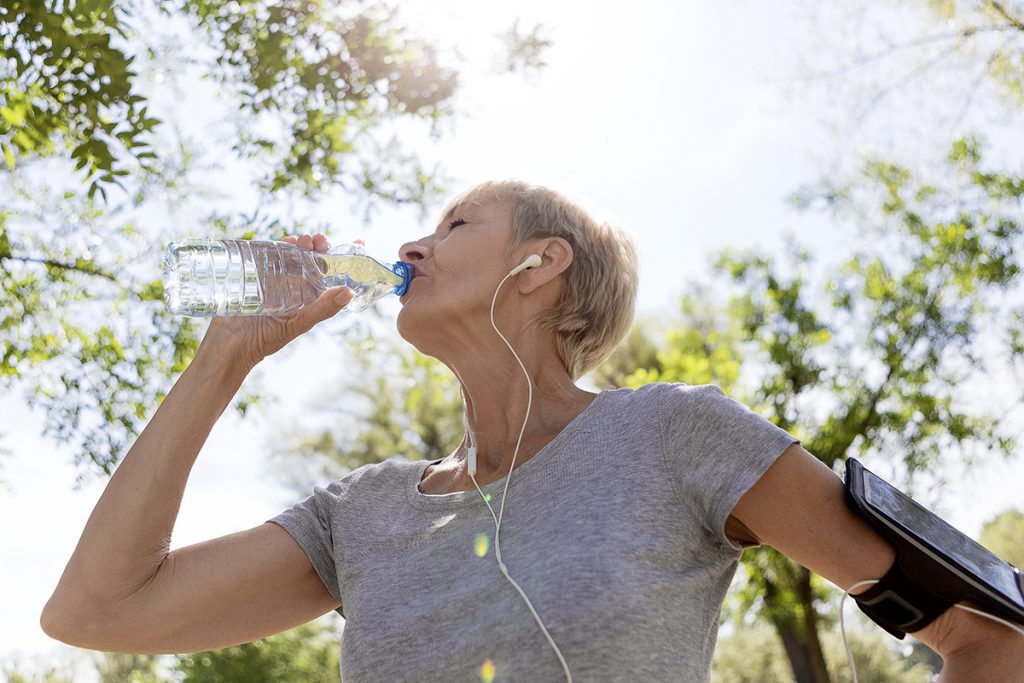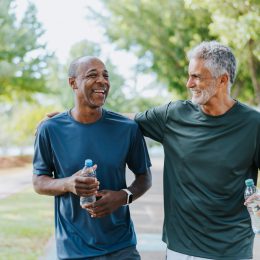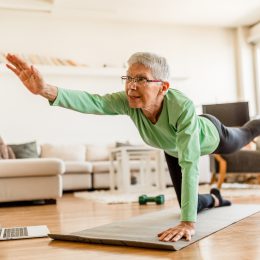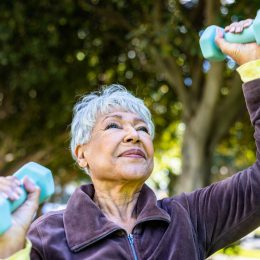5 Hot-Weather Tips to Avoid a Heat-Related Illness
Natural age-related changes make older adults more vulnerable to the harmful effects of high temperatures. Here’s what’s going on — and how to stay safe.

When humidity blankets the air and temperatures soar into the 80s, 90s, and 100s, it doesn’t matter how old you are, even a short walk to the mailbox is going to be miserable. But misery isn’t the only thing you need to be mindful of in hot weather. Older adults are particularly vulnerable to heat-related illnesses, says geriatrician Scott Kaiser, M.D., with Providence Saint John’s Health Center in Santa Monica, California.
“Aging changes the way our bodies regulate heat,” says Dr. Kaiser, who’s also director of Geriatric Cognitive Health for the Pacific Neuroscience Institute. That makes you more susceptible to heat-related illnesses like heat stroke.
Here’s why you need to take special considerations in hot weather, and how to stay safe.
The cool way to stay active, have fun, and get fit? With SilverSneakers! Classes and events are happening right now at participating gyms, online through SilverSneakers LIVE, and at community centers near you. Activate your free online account to get started.
Hot Weather Tip #1: Know Why Older Adults Are More Prone to Heat-Related Issues
There are a few factors at play, says Dr. Kaiser:
You sweat less. Sweating is the body’s way of cooling itself down. When sweat evaporates off your skin, your body temperature goes down. But as you get older, your body undergoes a few natural shifts that lead to changes in how you regulate body temperature.
Bottom line: You sweat less than you once did. With less sweat evaporating off your skin, you are more likely to get overheated.
Your thirst response has slowed down. Another way the body takes care of itself in the heat? Sending signals that make you feel thirsty and prompt you to drink water. In younger adults, thirst kicks in automatically when your body gets too hot. But that response is dulled in many older adults.
Chronic health conditions can impact the way your body handles heat. Cardiovascular disease, for example, affects how fluid is pumped throughout your body. That raises the risk of temperature regulation changes — even after a small exertion in hot weather. Asthma, COPD, and rheumatoid arthritis, among others, are also aggravated by high temps.
Side effects of common medications can too. Diuretics, for instance, can significantly raise your risk of dehydration — a major contributor to heat exhaustion. Allergy medications, beta blockers, certain diabetes medications, even over-the-counter pain relievers that contain caffeine can put you at higher risk for heat exhaustion and dehydration.
All of these factors can stack up together, adds Dr. Kaiser, making you more likely to experience a heat-related illness.
Hot Weather Tip #2: Learn the Different Types of Heat-Related Illness
Heat-related illnesses exist on a spectrum from mild to severe and potentially life-threatening.
Mild heat-related illnesses include:
- Heat rash. This causes small blisters on your skin, like the ones you get during an allergic reaction.
- Heat cramps. Extreme temperatures and dehydration can lead to painful muscle spasms.
- Heat syncope. This is sudden dizziness that comes on after exercising in hot weather.
- Heat edema. Some people’s ankles and feet swell up when they get too hot.
Moderate heat-related illness includes:
- Heat exhaustion. That’s when your body overheats because your body isn’t regulating temperature properly. It’s important to take action quickly at this stage to prevent your condition from progressing.
Severe heat-related illness includes:
- Heat stroke. That’s when your body cannot control its temperature anymore. Without emergency medical treatment, heat stroke can lead to permanent disability or death.
Hot Weather Tip #3: Spot the Signs of Heat Exhaustion — and React Right Away
“That initial feeling of something being ‘off’ is worth noticing,” says Dr. Kaiser. Heat exhaustion often comes on as a wave of weakness or fatigue.
Other symptoms include:
- Headache
- Decreased urine output
- Profuse sweating
- Thirst
- Lightheadedness
- Rapid pulse
- Irritability
Having just one or two of these symptoms should prompt you to act immediately — don’t wait to see if more symptoms develop. The sooner you take steps to cool your body down, the better.
Try this:
- Find a cool place to rest, preferably near a fan or in an air-conditioned space
- If you can’t get inside, rest in the shade
- Drink small sips of cool fluids like water or a sports drink
- Remove excess clothing, including outerwear, shoes, and socks
- Use cool compresses to bring down your body temperature. If possible, take a cool shower or bath.
“You want to err on the side of caution here,” says Dr. Kaiser. If symptoms don’t improve quickly or they get worse, it’s time to call 911 or head to the emergency room.
Hot Weather Tip #4: Know the Signs of Heat Stroke
Heat stroke is the most dangerous of all heat-related illnesses. It happens when your body becomes unable to regulate its own temperature. And it requires emergency medical attention to prevent death or permanent disability.
With heat stroke, the body’s temperature rises very quickly — potentially to 106 degrees or higher in just 10 minutes, according to the Centers for Disease Control and Prevention.
Other symptoms of heat stroke include:
Subscribe to our newsletter
It's quick and easy. You could be one of the 13 million people who are eligible.
Already a member? Click to discover our 15,000+ participating locations.
Follow Us
- Confusion
- Elevated body temperature
- Hot, dry skin or profuse sweating
- Loss of consciousness
- Seizures
- Slurred speech
If you think someone you’re with may be experiencing a heat stroke, act quickly: Call 911 and use water or ice to cool the body down while you wait for the ambulance. Loosen or remove any extra layers of clothing and use water or ice to cool the skin.
Hot Weather Tip #5: Adjust Your Daily Routine to Prevent Heat-Related Illness
Heat-related illness tends to take people by surprise, and it can strike on days that you don’t think are too hot.
Get into the habit of checking the weather before you go outside — and not just the temperature. You want to pay particular attention to the heat index, which is reflected as a “feels like” reading. That takes the humidity into account, too. Sometimes the heat index can be much higher than the actual temperature.
If you’re spending time outside, and especially if you’re physically active outdoors, take these steps to stay safe:
- Take frequent breaks
- Hydrate often (some people set alarms on their phones as reminders to drink water, says Dr. Kaiser)
- Use sunscreen and wear sun-protective clothing and hats to protect yourself against sunburn, which can affect body temperature regulation
- Skip alcoholic or caffeinated beverages, which can lead to dehydration
“Paying attention to your body overall and not challenging yourself in the heat is very important,” says Dr. Kaiser.
If you usually go for walks or runs outside, make a new plan for days when the heat index is high. That’s a great time to get into an air-conditioned gym and do a group SilverSneakers class.
Heat-related illness is a serious issue. But if you take steps to stay safe and hydrated, there’s no reason you can’t get out and enjoy the summer sunshine.
See our sources
Heat-related illness overview: Centers for Disease Control and Prevention
How high heat affects older adults: Centers for Disease Control and Prevention
Heat safety tips for older adults: National Institute on Aging
Heat stroke vs. heat exhaustion: National Oceanic and Atmospheric Administration
Check Your SilverSneakers Eligibility Instantly
SilverSneakers members can go to thousands of gyms and fitness locations across the nation, plus take SilverSneakers LIVE online classes that are designed for seniors of all levels. If you have a Medicare plan, it may include SilverSneakers — at no additional cost. Check your eligibility instantly here.
Already a member? Get your SilverSneakers member ID and exclusive fitness content by activating your online account here.
Not eligible for SilverSneakers? You can still get 200+ free SilverSneakers On-Demand videos and stay in touch with us by creating your online account.





